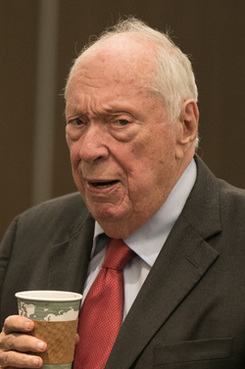Prior Salary Can't Justify Gender Wage Gap, En Banc Ninth Circuit Says
"To hold otherwise—to allow employers to capitalize on the persistence of the wage gap and perpetuate that gap ad infinitum—would be contrary to the text and history of the Equal Pay Act," Judge Stephen Reinhardt wrote for the majority.
April 09, 2018 at 12:45 PM
6 minute read
The original version of this story was published on The Recorder

A federal appeals court ruled Monday that salary history cannot be used to justify a wage gap between men and women, in a case that employee advocates said highlights a key issue that has institutionalized gender compensation inequities.
The U.S. Court of Appeals for the Ninth Circuit, which heard the case Rizo v. Fresno County Office of Education en banc last year, found that an employee's prior salary—either alone or in a combination of factors—cannot be used to justify paying women less than men in comparable jobs.
“The Equal Pay Act stands for a principle as simple as it is just: men and women should receive equal pay for equal work regardless of sex,” Judge Stephen Reinhardt wrote in the opinion. “The question before us is also simple: can an employer justify a wage differential between male and female employees by relying on prior salary? Based on the text, history, and purpose of the Equal Pay Act, the answer is clear: No.”
The courts have moved in different directions on this question. Two federal appeals courts—the Tenth and Eleventh circuits—previously held that prior pay alone cannot be considered as an exemption to equal pay laws. The Seventh Circuit has ruled that previous salary could be considered. The Ninth Circuit on Monday fractured over whether pay history can ever be considered.
 Judge Stephen Reinhardt. Credit: Jason Doiy/ The Recorder
Judge Stephen Reinhardt. Credit: Jason Doiy/ The RecorderReinhardt, who was widely recognized as one of the country's most liberal judges, died last week at the age of 87. The ruling noted the voting was complete before his death.
Aileen Rizo, a math consultant in Fresno County, California, filed the suit in 2012 after she discovered she was paid less than male counterparts by as much as $10,000. The county justified the pay differential based on the previous salary she made at a school in Arizona. The three-judge panel of the Ninth Circuit ruled that salary could be used by the county to justify the discrepancy. The case will return to the district court.
In Monday's ruling overturning the panel decision, Reinhardt wrote, “Salaries speak louder than words.” He noted that the Equal Pay Act prohibits sex-based wage discrimination but prior to this decision the law was unclear on whether an employer could consider prior salary in determining pay scale. The majority ruling found that “to accept the county's argument would perpetuate rather than eliminate the pervasive discrimination” that the federal law aimed to protect.
“In light of the clear intent and purpose of the Equal Pay Act, it is equally clear that we cannot construe the catchall exception as justifying setting employees' starting salaries on the basis of their prior pay,” Reinhardt wrote. “At the time of the passage of the act, an employee's prior pay would have reflected a discriminatory marketplace that valued the equal work of one sex over the other. Congress simply could not have intended to allow employers to rely on these discriminatory wages as a justification for continuing to perpetuate wage differentials.”
Jones Day partner Shay Dvoretzky in Washington argued for the Fresno school district in the Ninth Circuit.
Fresno County intends to petition the Supreme Court to review the Ninth Circuit decision, according to a statement provided by Michael Woods, of counsel to McCormick Barstow LLP, which also represented the district in the appeal.
The Fresno County Superintendent of Schools said the policy that determines salaries was “absolutely gender-neutral, objective and effective in attracting qualified applicants and complied with all applicable laws.”
Several judges expressed concern about the reach and practical implications of the majority's ruling, which was expressed as a “general rule” that did not touch individualized, negotiated salary discussions.
“Although the majority professes that its decision does not relate to negotiated salaries, the principle of the majority's holding may reach beyond these state statutes by making it a violation of federal anti-discrimination law to consider prior salary, even when an employee chooses to provide it as a bargaining chip for higher wages,” Judge M. Margaret McKeown, joined by Judge Mary Murguia, wrote in a concurring opinion. “I am concerned about chilling such voluntary discussions. Indeed, the result may disadvantage rather than advantage women.”
➤➤ Get employment law news and commentary straight to your in-box with Labor of Law, a new Law.com briefing. Learn more and sign up here.
The U.S. Equal Employment Opportunity Commission and other women's rights advocates had urged the court to reconsider the panel decision, saying that any validation of such a practice would institutionalize the gender pay gap. Studies show women make 80 cents on the dollar to their male counterparts and that the disparities are pervasive across industries.
Several cities and states have banned salary history inquiries or have proposals pending, including California, Delaware, Massachusetts, Oregon, New Orleans, Philadelphia, Pittsburgh, New York City and Puerto Rico.
Closely watched gender-pay cases are moving forward in state and federal courts against major U.S. companies, including Google Inc. and Goldman Sachs. In the Google case, as many as 5,000 women across several different job positions comprise the class. The plaintiffs lawyers in that case zeroed in on the tech giant's company-wide policy that allows for job applicants to divulge their prior salaries.
The ruling is posted below:
Read more:
Labor of Law: Pay Equity Classes Grow | Flipping Off, Then Fired
Google Must Face Female Employees' Class Claims Alleging Pay Disparities
Judge Stephen Reinhardt, Liberal Lion on Ninth Circuit, Dies at 87
Prior Salary Can't Justify Paying Women Less, Ninth Circuit Is Told
Sharon Gustafson, EEOC General Counsel Pick, Discloses Law Firm Income
Companies Are Warned About Compliance 'Minefields' for Pay Equity
This content has been archived. It is available through our partners, LexisNexis® and Bloomberg Law.
To view this content, please continue to their sites.
Not a Lexis Subscriber?
Subscribe Now
Not a Bloomberg Law Subscriber?
Subscribe Now
NOT FOR REPRINT
© 2025 ALM Global, LLC, All Rights Reserved. Request academic re-use from www.copyright.com. All other uses, submit a request to [email protected]. For more information visit Asset & Logo Licensing.
You Might Like
View All
The Right Amount?: Federal Judge Weighs $1.8M Attorney Fee Request with Strip Club's $15K Award

Kline & Specter and Bosworth Resolve Post-Settlement Fighting Ahead of Courtroom Showdown
6 minute read
12-Partner Team 'Surprises' Atlanta Firm’s Leaders With Exit to Launch New Reed Smith Office
4 minute read
Morgan Lewis Shutters Shenzhen Office Less Than Two Years After Launch
Trending Stories
- 1Critical Mass With Law.com’s Amanda Bronstad: LA Judge Orders Edison to Preserve Wildfire Evidence, Is Kline & Specter Fight With Thomas Bosworth Finally Over?
- 2What Businesses Need to Know About Anticipated FTC Leadership Changes
- 3Federal Court Considers Blurry Lines Between Artist's Consultant and Business Manager
- 4US Judge Cannon Blocks DOJ From Releasing Final Report in Trump Documents Probe
- 5White & Case KOs Claims Against Voltage Inc. in Solar Companies' Trade Dispute
Who Got The Work
J. Brugh Lower of Gibbons has entered an appearance for industrial equipment supplier Devco Corporation in a pending trademark infringement lawsuit. The suit, accusing the defendant of selling knock-off Graco products, was filed Dec. 18 in New Jersey District Court by Rivkin Radler on behalf of Graco Inc. and Graco Minnesota. The case, assigned to U.S. District Judge Zahid N. Quraishi, is 3:24-cv-11294, Graco Inc. et al v. Devco Corporation.
Who Got The Work
Rebecca Maller-Stein and Kent A. Yalowitz of Arnold & Porter Kaye Scholer have entered their appearances for Hanaco Venture Capital and its executives, Lior Prosor and David Frankel, in a pending securities lawsuit. The action, filed on Dec. 24 in New York Southern District Court by Zell, Aron & Co. on behalf of Goldeneye Advisors, accuses the defendants of negligently and fraudulently managing the plaintiff's $1 million investment. The case, assigned to U.S. District Judge Vernon S. Broderick, is 1:24-cv-09918, Goldeneye Advisors, LLC v. Hanaco Venture Capital, Ltd. et al.
Who Got The Work
Attorneys from A&O Shearman has stepped in as defense counsel for Toronto-Dominion Bank and other defendants in a pending securities class action. The suit, filed Dec. 11 in New York Southern District Court by Bleichmar Fonti & Auld, accuses the defendants of concealing the bank's 'pervasive' deficiencies in regards to its compliance with the Bank Secrecy Act and the quality of its anti-money laundering controls. The case, assigned to U.S. District Judge Arun Subramanian, is 1:24-cv-09445, Gonzalez v. The Toronto-Dominion Bank et al.
Who Got The Work
Crown Castle International, a Pennsylvania company providing shared communications infrastructure, has turned to Luke D. Wolf of Gordon Rees Scully Mansukhani to fend off a pending breach-of-contract lawsuit. The court action, filed Nov. 25 in Michigan Eastern District Court by Hooper Hathaway PC on behalf of The Town Residences LLC, accuses Crown Castle of failing to transfer approximately $30,000 in utility payments from T-Mobile in breach of a roof-top lease and assignment agreement. The case, assigned to U.S. District Judge Susan K. Declercq, is 2:24-cv-13131, The Town Residences LLC v. T-Mobile US, Inc. et al.
Who Got The Work
Wilfred P. Coronato and Daniel M. Schwartz of McCarter & English have stepped in as defense counsel to Electrolux Home Products Inc. in a pending product liability lawsuit. The court action, filed Nov. 26 in New York Eastern District Court by Poulos Lopiccolo PC and Nagel Rice LLP on behalf of David Stern, alleges that the defendant's refrigerators’ drawers and shelving repeatedly break and fall apart within months after purchase. The case, assigned to U.S. District Judge Joan M. Azrack, is 2:24-cv-08204, Stern v. Electrolux Home Products, Inc.
Featured Firms
Law Offices of Gary Martin Hays & Associates, P.C.
(470) 294-1674
Law Offices of Mark E. Salomone
(857) 444-6468
Smith & Hassler
(713) 739-1250








